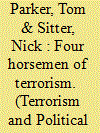|
|
|
Sort Order |
|
|
|
Items / Page
|
|
|
|
|
|
|
| Srl | Item |
| 1 |
ID:
077130


|
|
|
|
|
| Publication |
2007.
|
| Summary/Abstract |
Terrorist groups have yet to attract the same level of academic interest as other social movement organizations (SMOs), although they are well suited to the analytical approach pioneered by Ted Gurr, Doug McAdam, Sidney Tarrow, and Charles Tilly. Social constructivism offers a valuable frame with which to assess state responses to terrorism. Carlos Marighela argued that one of the principal goals of the urban guerrilla was to goad the state into a spasm of overreaction that would undermine its legitimacy in the eyes of the public. This article takes Marighela's concept one step further, arguing that by adopting repressive counterterrorism policies, democratic states "socially construct" more resilient, more aggressive terrorist organizations. Like Hercules' antagonist Antaeas in Greek mythology, terrorist groups draw their strength from their surrounding environment. Successful counterterrorism strategies erode popular support for terrorism and unsuccessful ones contribute to it. This paper examines the experiences of five democratic states - the United Kingdom, Germany, Canada, Italy, and Israel - from this perspective and concludes that when confronting terrorism, the greatest challenge of all is to adopt and maintain a measured response to terrorist outrages
|
|
|
|
|
|
|
|
|
|
|
|
|
|
|
|
| 2 |
ID:
144919


|
|
|
|
|
| Summary/Abstract |
David Rapoport's concept of Four Waves of terrorism, from Anarchist terrorism in the 1880s, through Nationalist and Marxist waves in the early and mid-twentieth century, to the present Religious Wave, is one of the most influential concepts in terrorism studies. However, this article argues that thinking about different types of terrorism as strains rather than waves better reflects both the empirical reality and the idea that terrorists learn from and emulate each other. Whereas the notion of waves suggests distinct iterations of terrorist violence driven by successive broad historical trends, the concept of strains and contagion emphasizes how terrorist groups draw on both contemporary and historical lessons in the development of their tactics, strategies, and goals. The authors identify four distinct strains in total—Socialist, Nationalist, Religious, and Exclusionist—and contend that it is possible to trace each strain back to a “patient zero” active in the 1850s.
|
|
|
|
|
|
|
|
|
|
|
|
|
|
|
|
| 3 |
ID:
139327


|
|
|
|
|
| Summary/Abstract |
Over the past 150 years, terrorist organisations around the world have adopted a similar range of core tactics to advance their cause, including the provocation of states into an overreaction to the threat posed by terrorism. In doing so, states fall into a deliberate trap set by the terrorists, with their own actions ultimately undermining their legitimacy to govern. Tom Parker argues that terrorist groups have been remarkably open and consistently candid about their intentions to capitalise on this weakness and that it is time that governments – and the societies they preside over – begin to benefit from their candour.
|
|
|
|
|
|
|
|
|
|
|
|
|
|
|
|
|
|
|
|
|